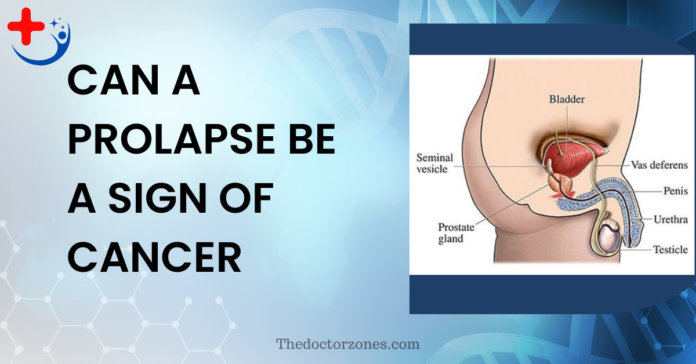Can A Prolapse Be A Sign Of Cancer?
Yes, a prolapse can sometimes be associated with cancer, but it’s important to understand the context and details of the situation. Prolapse refers to the descent or falling down of an organ from its normal position. This can happen in various parts of the body, such as the pelvic organs (uterus, bladder, rectum) or the gastrointestinal tract. Discover about Can Mold Cause Cancer
Pelvic organ prolapse is a common condition, often linked with childbirth and aging, where organs shift from their normal positions within the pelvic region. However, concerns frequently arise about whether conditions like uterine, rectal, or vaginal prolapse can be symptoms of more serious underlying health issues, such as cancer. In this article, we’ll explore the connections between prolapse and cancer, addressing common questions and concerns, such as “Can a prolapse be cancerous?” and “Is prolapse a cancer warning sign?”
What is Prolapse?
Prolapse occurs when an organ or tissue slips out of its usual place and protrudes into another part of the body. In pelvic organ prolapse, this typically involves the bladder (cystocele), rectum (rectocele), uterus (uterine prolapse), or small intestine (enterocele). The protrusion into the vaginal canal can lead to symptoms like discomfort, a feeling of fullness or bulging in the pelvis, and complications with urination or bowel movements. Read about Is Heel Pain a Sign of Cancer
Can Prolapse Indicate Cancer?
While prolapse itself is primarily related to the weakening of the muscles and tissues of the pelvic floor, it is not directly a symptom of cancer. However, the question arises, “Can cancer cause a prolapse?” In some cases, yes. For instance, significant abdominal masses or cancers that involve pelvic structures may exert pressure that contributes to prolapse. This makes it essential to understand both prolapse symptoms and cancer signs for early detection and treatment.
How is Prolapse Related to Cancer?

Prolapse and cancer are connected in a few critical ways:
- Secondary Prolapse Due to Cancer: Conditions like bladder or colorectal cancer can lead to changes in pelvic anatomy, potentially causing or exacerbating a prolapse.
- Symptom Overlap: Some symptoms such as unexplained bleeding, persistent pain, or changes in bowel habits can be common in both prolapse and various cancers, leading to necessary diagnostic evaluations like cancer screening to rule out malignancies.
- Surgical Consequences: Treatments for pelvic cancers, including surgery, can sometimes lead to prolapse due to alterations in the structural support of the pelvic region. Also, read the Article: Is Emphysema Cancer
Evaluating the Risks: Prolapse and Cancer
It’s crucial to differentiate when prolapse might be a sign of cancer. While conditions like rectal prolapse or uterine prolapse are generally not cancerous, they can present symptoms that are also common in cancers affecting these areas. For instance, “Does rectal prolapse signal cancer?” or “Is vaginal prolapse a sign of cancer?” are valid concerns that require professional medical evaluation to ensure accurate diagnosis and appropriate management.
Prolapse Treatment and Cancer Considerations

Treatment for prolapse varies depending on its severity, ranging from nonsurgical options like pelvic floor therapy and pessaries to surgical interventions using meshes or reconnective surgeries such as sacral colpopexy. In cases where prolapse is linked with cancerous growths or as a complication of cancer treatment, managing the cancer effectively becomes a priority to mitigate the impact on prolapse.
Prolapse Prevention and Cancer Screening
Maintaining pelvic health is crucial for both preventing prolapse and detecting cancer early. Engaging in regular pelvic floor exercises, managing weight, avoiding heavy lifting, and following through with recommended cancer screenings can help mitigate the risk factors associated with both conditions.
Conclusion
While pelvic organ prolapse and cancer can be interconnected, prolapse itself is not a direct indicator of cancer. However, because of the overlapping symptoms and potential complications, it’s essential for individuals experiencing signs of prolapse to undergo thorough medical evaluations to rule out any underlying cancers. Early detection and treatment remain key in managing both prolapse and potential oncological issues effectively.
FAQs
- Does prolapse lead to cancer? No, prolapse does not cause cancer, but the presence of cancer can influence the development of prolapse.
- How often is prolapse linked to cancer? Prolapse is occasionally linked to cancer due to anatomical changes from tumors or treatment effects.
- What types of cancer cause prolapse? Cancers that impact pelvic structures, like cervical, colorectal, and bladder cancer, can contribute to prolapse by altering pelvic anatomy.








